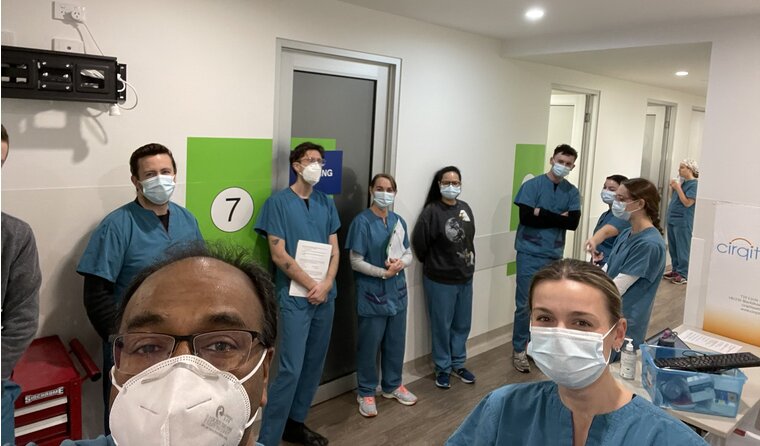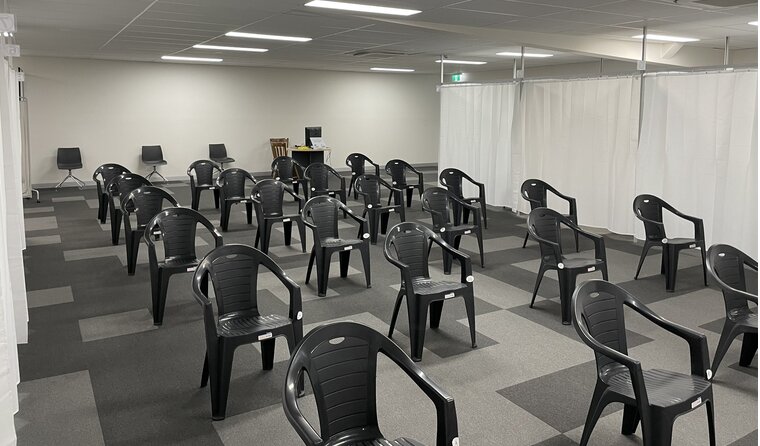News
Melbourne general practice becomes state’s first to administer Pfizer
Can GPs expect to secure supply of the vaccine? Does administration differ to AstraZeneca? newsGP speaks to practice owner Dr Mukesh Haikerwal.
 The staff at Circle Health in Altona North, led by Dr Mukesh Haikerwal, administered 120 doses of Pfizer in three hours. (Image: AAP)
The staff at Circle Health in Altona North, led by Dr Mukesh Haikerwal, administered 120 doses of Pfizer in three hours. (Image: AAP)
It was the first general practice in Victoria to set up drive-thru COVID testing, and now Dr Mukesh Haikerwal’s practice-cum-Commonwealth Vaccination Hub has become the state’s first to start administering Pfizer.
Located in Melbourne’s west, the GP and his staff delivered 120 doses in three hours to patients aged under 50 after receiving their first batch of Pfizer last week.
After their first run, Dr Haikerwal told newsGP the process of administering Pfizer is not dissimilar to AstraZeneca.
‘[They] make it sound so difficult, and it’s not,’ he said.
‘The only thing is it’s very fiddly in making it up because the [vials] only have six doses in them. Also, you’ve got to agitate the bottle before you put saline in, then agitate it again and very carefully draw it out.
‘That’s it, there’s no other difficulty.’
Due to Pfizer’s requirements for cold chain storage at -70°C, it was initially thought that GPs would focus solely on AstraZeneca, which has no such storage hurdles. But updated advice from the Therapeutic Goods Administration (TGA) means Pfizer can be stored at domestic freezer temperatures of 2–8°C for up to 31 days.
When the prospect of general practice getting involved with the mRNA vaccine arose, Dr Haikerwal was quick to put his hand up, but his practice’s involvement came as something of a surprise.
‘We expressed an interest … and we were negotiating when a press release went out without us knowing, naming our clinic,’ he said.
‘So we didn’t want to let the side down, we wanted to show that general practice could do this, and we are going to make it deliver.’

Dr Mukesh Haikerwal and his team at his clinic in Melbourne's west ahead of their first Pfizer vaccination session. (Image: Supplied)
During the Department of Health’s (DoH) most recent webinar, the DoH’s First Assistant Secretary for the COVID-19 Primary Care Response Dr Lucas de Toca called the change to Pfizer’s storage requirements a ‘game changer’.
He advised that a limited number of Commonwealth Vaccination Clinics (formerly GP-led respiratory clinics) would be given access to the vaccine, specifically in areas with specific need.
‘But the idea is that within the next few weeks all Commonwealth Vaccination Clinics that are willing and able to also offer the Pfizer vaccine will be given that option,’ Dr de Toca said.
‘And then we will be … looking at moving on to a greater role of primary care in the delivery of the Pfizer vaccine as supplies increase later in the year.’
Victoria’s GPs have seen demand for COVID vaccinations significantly increase as the state continues through its fourth lockdown, and despite the DoH having increased supply in May, practices have reported having to turn eligible people away due to limited doses.
Melbourne GP Dr Nathan Pinskier told newsGP his six practices are collectively administering 2000 vaccines per week, but that it would be an ideal time to increase their offering and respond to demand.
‘I regularly stand behind reception and I would say nine out of 10 calls are for vaccination,’ he said.
‘I know for certain that if we had Pfizer available, we could vaccinate even more people, because at the moment we can only do over 50-year-olds.’
The Federal Government has said it will be prioritising Victoria with vaccine supply as it works to get its outbreak under control. This includes an additional 100,000 Pfizer doses (from 14 June), while GPs’ supply of AstraZeneca will be doubled for the next two weeks from 115,000 to 230,000.
Dr Haikerwal says while more vaccine supply is crucial for GPs, consistency in supply is also key.
As it stands, his practice has received two batches of 240 doses of Pfizer, half of which will be kept in an on-site fridge to ensure every patient who receives their first dose will receive their second within the recommended 21 days.
‘So everybody that’s been vaccinated today with dose one will get dose two from here, and if there’s more supply, then we’ll do more … but only when there’s enough for dose two,’ Dr Haikerwal said.
‘We have no idea when the next supply is going to come. We’ve not booked any more clinics, and we’re not going to book any more until there’s vaccine in the fridge.’

The set up at Dr Haikerwal's practice, where patients are observed for 15 minutes after vaccination, ensuring social distancing practices are observed. (Image: Supplied)
In addition to delivering vaccines, GPs are also having to manage business as usual and, in Dr Haikerwal’s case, COVID testing. The demand means his team has been forced to conduct vaccination sessions after hours.
But for that to sustainable, Dr Haikerwal says the infrastructure around the vaccine rollout needs further consideration.
‘We’re going over and above to protect our population. But we’ve got to make sure that there’s going to be a fair and equitable way of doing this,’ he said.
‘In other words, Medicare.
‘Whatever the rebate that they’ve done, which is a joke anyway, should at least cut in an after-hours rate, after 5.00 pm. They can do that without blinking.
‘GPs can do Pfizer, we can do AstraZeneca, just give us the tools and we’ll do it.’
Log in below to join the conversation.
AstraZeneca COVID-19 Pfizer vaccine rollout
newsGP weekly poll
Health practitioners found guilty of sexual misconduct will soon have the finding permanently recorded on their public register record. Do you support this change?